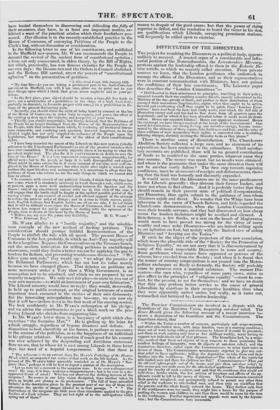DIFFICULTIES OF THE DISSENTERS.
THE project for reuniting the Dissenters as a political body, appears unlikely to succeed. A trusted organ of a considerable and influ- ential portion of the Nonconformists, the Leicestershire Mercury, protests against the leadership offered to them in the Eclectic Re- view article, to which we recently called attention. From private sources we learn, that the London gentlemen who undertook to . ⢠manage the affairs of the Dissenters, and as their representatives were in constant communication with Ministers, have not gained the confidence of their late constituents. The Leicester paper thus describes the " London Committees "â " Hnlf-hearted in their attachment to principles, truckling in their policy, arrogant towards their too confiding country friends, meanly subservient to the Ministry of the day, greedy of funds, and profuse in their distribution of them amongst their necessitous functionaries, supine svhen they ought to be active, forward and overbearing whct! they ought to be quiet, these 'London Com- mittees' have ever been the loose and sandy waste, over which the full tide of Dissenting energy and zeal has had to flow down from all quarters upon the Legislature, and by which it has been iffiscrbed before it could reach its desti- nation. Hence our repeated failures! Hence our apparent weakness! Hence the contempt we have always received at the hands of the Government Our moral determination, our strong our resistless energy, became trans- muted by the alchemy of these organs, into feebleness and fear; and the voice of three millions of men demanding their rights, is converted into a hesitating, faltering whisper, slavishly inviting the Ministry to do as they please." â˘
There is another cause of dissatisfaction. The Church-rate Abolition Society collected a large sum, and no statement of its expenditure has been rendered to the subscribers. Until satisfac- tory accounts are published, there will be no general contribution of funds to be confided: to the same parties, whatever name they may assume. The money was spent, but no results were obtained; and where is the guarantee that under the same direction there will not be another costly failure? The first step towards regaining confidence, must be an account of receipts and disbursements, show- ing that the fund was honestly and discreetly expended. It would seem that the Dissenters are in the same predicament as the Liberals generally : they distrust their former leaders, and know not where to find others. And it is probably better that they should remain in their present state of political dlsorganization, qua Dissenters, than again submit to the guidance of men :whom Ministers cajole and direct. No wonder that the Whigs have been lukewarm in the cause of Church Reform, and little regarded the Church-rate demonstrations, when the London Committee-men were their humble servants, and they had discovered on how cheap terms the loudest declaimers might be soothed and silenced. A little flattery, a few franks, or a seat on the bench of Magistrates, would seem to have proved too strong for the virtue of many wealthy and once noisy Dissentersâwho are indeed willing again to set agitation on foot, but mainly with the limited view of aiding Ministers and " keeping out the Tories." If such, be the object of -the projectors of the new association, which bears the plausible title of the "Society for the Promotion of Religious Equality," we are not sorry that it is discountenanced by many of the most respectable Dissenters in town and country. Some gentlemen, whose names have appeared as patrons of the scheme, have seceded from the Society ; and when it is found that the money of country congregations is not poured into the Metro- politan exchequer as freely as formerly, the Society will probably cease to preserve even a nominal existence. The earnest Dis;.
sentersâthe men who, regardless of mere party views, strive to give effect to the principles of "religious equality "âmust be con- tent, for the present, to act for themselves: and we have no doubt that they may perfbrm better service to the cause of general Liberalism by exertions in their respective localities, than when they were apparently united under, but really, as it turns out, trammelled and betrayed by, London leadership.


























 Previous page
Previous page